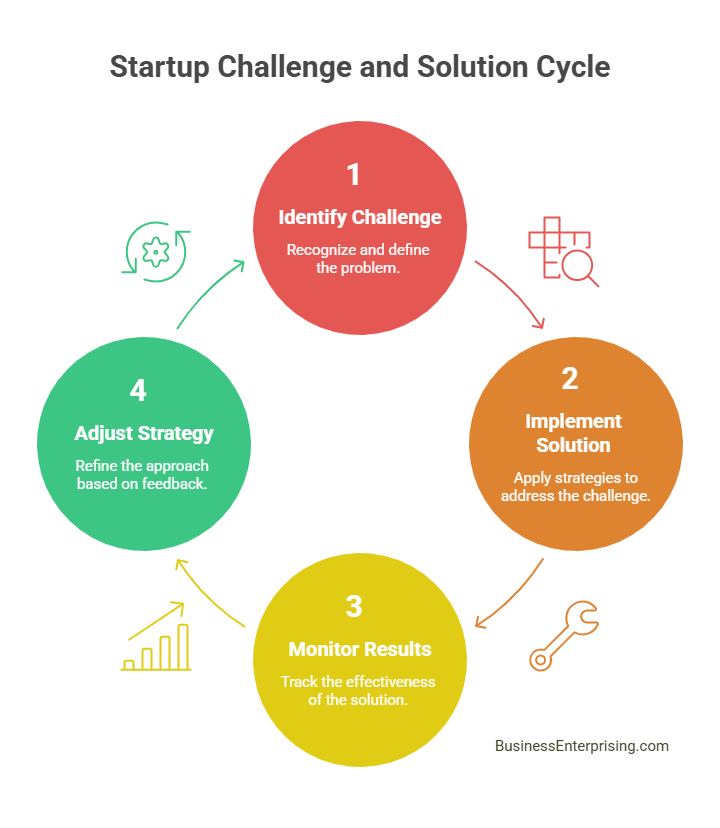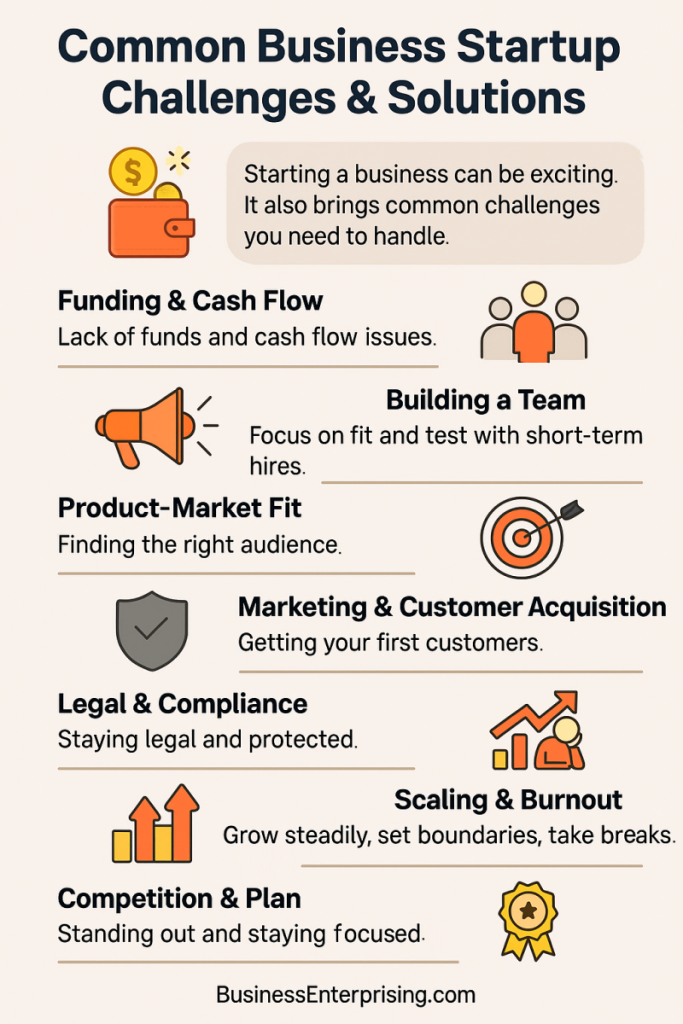 Starting your own business is full of excitement and possibility, but it also comes with plenty of startup challenges. These challenges can catch you off guard if you’re not ready. However, many entrepreneurs find that facing them head-on builds confidence and skill. Therefore, it’s good to think about what might go wrong and plan for it.
Starting your own business is full of excitement and possibility, but it also comes with plenty of startup challenges. These challenges can catch you off guard if you’re not ready. However, many entrepreneurs find that facing them head-on builds confidence and skill. Therefore, it’s good to think about what might go wrong and plan for it.
Additionally, you’ll probably deal with money concerns, like running out of funds or struggling with cash flow. These problems can slow down even the best idea. However, you can learn how to work around them by staying flexible and watching your spending. Talking to others who’ve faced similar issues can also help you avoid common mistakes.
Building the right team can be another big hurdle. You want people who share your vision and are ready to work hard. Therefore, think carefully about who you bring on board and how you support them. However, remember that it’s okay to make changes if something isn’t working out.
Additionally, you might face marketing or legal questions that you didn’t think of at first. These small details can turn into bigger problems later. Therefore, it’s smart to keep an eye on how you’re presenting your business and what you promise to customers. However, don’t let these worries stop you from moving forward.
Every startup has its own set of challenges, but you don’t have to face them alone. When you stay alert and open to learning, you can find ways to grow stronger. Your ability to adapt will help you turn those early tests into opportunities to build a better business.
Financial Constraints and Cash Flow Issues
One of the biggest startup challenges you’ll face is managing money and keeping cash flow healthy. Many startups have great ideas but struggle to find the funding they need to bring them to life. This makes it hard to cover basic costs like paying staff and buying materials. However, there are ways to manage these challenges and keep moving forward.
Additionally, one way to handle cash flow issues is to create a simple budget. By tracking how much you spend and what you earn, you’ll get a clearer picture of your financial health. Therefore, you can spot problems early and make changes before they grow. This also helps you see which areas need more attention, like spending less on marketing or negotiating better deals with suppliers.
However, some startups find that money problems come from not getting paid on time. This can happen when clients pay late or when deals take longer to close. Therefore, it’s smart to talk to clients about payment terms and to send reminders for overdue bills. This small step can help you avoid bigger problems later.
Additionally, you might want to look for different ways to bring in cash. This could mean offering new services or products that bring in faster payments. It might also mean taking a small loan to cover gaps until you get paid. However, be careful not to borrow more than you can handle. It’s better to start small and build as you go.
When you pay attention to your money, you give your startup a better chance to grow. You’ll feel more confident knowing you’re taking steps to stay on top of your cash flow. Good financial habits are key to handling startup challenges and keeping your business moving forward.
Building the Right Team
Building the right team is one of the most important parts of running a startup. The people you bring on board will help shape how your business grows. However, finding the right fit can be tough. Many startups hire fast because they need help, but they often end up with people who don’t match their values.
Additionally, it’s easy to get caught up in what looks good on paper. You might see a great resume and miss signs that a person might not work well in a startup. Therefore, you should think about how someone will fit with your team’s style and values. Hiring isn’t just about skills; it’s about attitude and how well they work with others.
However, leadership is just as important as hiring. Your team will look to you for guidance and support. Therefore, you need to be clear about what you want and what you expect. Clear goals and honest feedback help everyone stay on the same page.
Additionally, building a good team culture takes time. You have to show your team that you value them and their ideas. This creates trust and makes it easier for everyone to work together. However, if you don’t work on culture, even the best hires can lose interest.
When you focus on building the right team, you’ll see that people are more likely to stay and work hard. You’ll face many startup challenges along the way, but with the right people, you’ll have a much better chance of making your idea work. Building a team is about more than just jobs; it’s about creating a place where people want to do their best work.
Product-Market Fit and Customer Validation
Finding product-market fit can be one of the hardest startup challenges you’ll face. It means making sure your product meets real needs. Many startups launch quickly but struggle to see if their product truly fits what people want. This can waste time and money if you’re not careful.
Additionally, it’s easy to believe that your idea is perfect just because you like it. However, your customers might not see it the same way. Therefore, you should always test your ideas with real people. Get feedback as early as possible to see what people really think.
However, finding product-market fit isn’t about changing everything at once. Start by listening to your customers and adjusting one piece at a time. You might change a feature or how you talk about your product. Each small change can bring you closer to what your customers want.
Additionally, customer validation is an ongoing process. Even if you think you’ve got it right, you need to keep checking in with your market. People’s needs change, and you have to stay ready to shift with them. Therefore, you should make feedback part of your regular routine.
When you work to understand your customers, you’ll make better decisions about what to build next. This helps you avoid building things that don’t matter. It also helps you find real demand and avoid wasting effort. Product-market fit and customer validation are tough startup challenges, but they’re worth the work. They help you build something that people want to use and pay for.
Marketing and Customer Acquisition
One of the biggest startup challenges you’ll face is building a customer base that supports your growth. At first, it can feel like no one knows you exist. Therefore, you need to find creative ways to get your name out there. You don’t need a huge budget to start marketing, but you do need a clear plan.
Additionally, one way to begin is by talking to people who already know and trust you. Friends and family can help spread the word and offer honest feedback. However, you should also look beyond them and find ways to reach your target audience. This might include setting up a simple website or sharing updates on social media.
However, just getting people to hear about you isn’t enough. You also need to show them why your product or service matters. Therefore, focus on what makes you different and how you solve their problems. This can help you stand out, even if your product isn’t the only one of its kind.
Additionally, listening to your early customers is important. They can tell you what’s working and what isn’t. Use this feedback to improve how you present your product. Therefore, you’re not just selling; you’re building trust and showing that you care about their needs.
When you’re starting out, keep your message simple and direct. Avoid fancy words or promises you can’t keep. Clear, honest communication can build a strong base of customers who are willing to try what you offer. These early connections can lead to steady growth and help you handle the startup challenges that come later.
Scaling Operations Without Breaking the Business
Growing your business can be exciting, but moving too fast can be one of the hardest startup challenges. You want to build on your early success without stretching your resources too thin. Therefore, it’s important to think about what growth looks like and how you’ll manage it. Start small and build up at a pace that feels right for your team and budget.
Additionally, adding new people or tools too soon can cause problems later. It’s tempting to think bigger is always better, but that’s not always true. Therefore, take time to understand what your business really needs at each step. This can help you avoid spending money on things that don’t matter or hiring people you don’t need yet.
However, you also need to plan for what’s next. If demand for your product grows, you’ll want to be ready to meet it. Therefore, you might look at ways to make your work faster or easier, like updating processes or using new software. This helps you stay focused on the most important parts of your business.
Additionally, talking to your team is important. They might see problems or chances for improvement you didn’t notice. By staying open and listening, you can fix small issues before they turn into big ones. However, don’t be afraid to say no to new ideas that don’t make sense for your goals.
Scaling your operations takes patience and steady effort. When you’re clear about what you want and how to get there, you’ll see real progress without the risk of growing too fast. This careful approach helps you handle startup challenges while setting yourself up for long-term success.
Legal and Compliance Hurdles
One of the most overlooked startup challenges is dealing with legal and compliance issues. These problems can slow you down or cost you a lot of money. However, you can avoid many of these issues by understanding what’s expected from the start. Therefore, take time to learn about the laws that apply to your business and how they work in your industry.
Additionally, you should think about protecting your business name and ideas. Registering your business and getting trademarks for your brand can stop problems before they start. However, you also need to think about how you treat customer data and keep it safe. Privacy rules are strict and breaking them can lead to fines or lost trust.
However, legal and compliance work isn’t just about the big issues. It’s also about day-to-day details, like making sure your contracts are clear and fair. Therefore, you might want to talk to someone who knows the rules well, like a lawyer or advisor. They can help you find small gaps or problems you didn’t see.
Additionally, don’t be afraid to ask questions. If something doesn’t make sense, it’s better to ask early than fix a big mistake later. When you pay attention to these small details, you’ll save yourself from bigger issues down the line.
Taking care of legal and compliance work might feel like extra work at first. However, it’s part of making sure your business is built on solid ground. These steps can help you avoid startup challenges and keep you focused on growing your business the right way.
Conclusion
Starting a business can be exciting, but it can also bring its share of startup challenges. You’ll face money problems, team issues, and questions about how to grow. However, you can tackle each challenge by staying focused and taking things one step at a time. Therefore, always keep an open mind and look for ways to make your ideas better.
Additionally, talking to your team and asking for help can save you from making costly mistakes. They can help you see problems you missed and share smart ideas. However, remember that not every idea will work for your business. Therefore, it’s okay to say no to something that doesn’t fit your plan.
However, don’t let fear of making mistakes stop you. Mistakes are part of growing and learning. Each challenge teaches you something new about how to run a business. Therefore, treat each setback as a chance to learn and do better next time.
Additionally, try not to rush into big decisions without checking the facts. You might feel pressure to move fast, but steady progress builds a stronger business. However, that doesn’t mean you can’t take smart risks. Just think them through before you make the call.
When you face each challenge with clear eyes and steady effort, you’ll see that most problems can be solved. These startup challenges are tests that help you build a business you can be proud of. You’re not alone, and there’s always a way forward.



